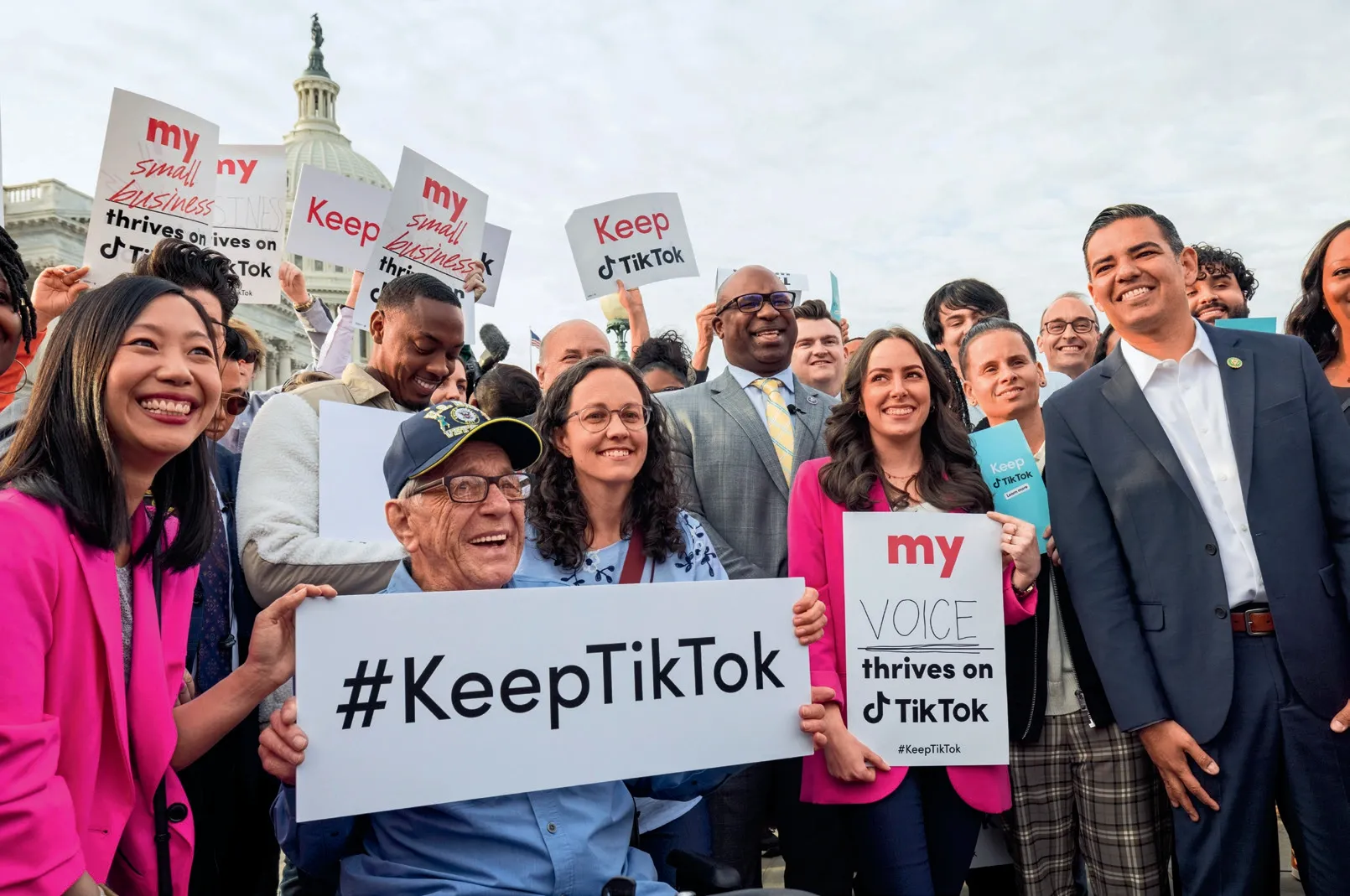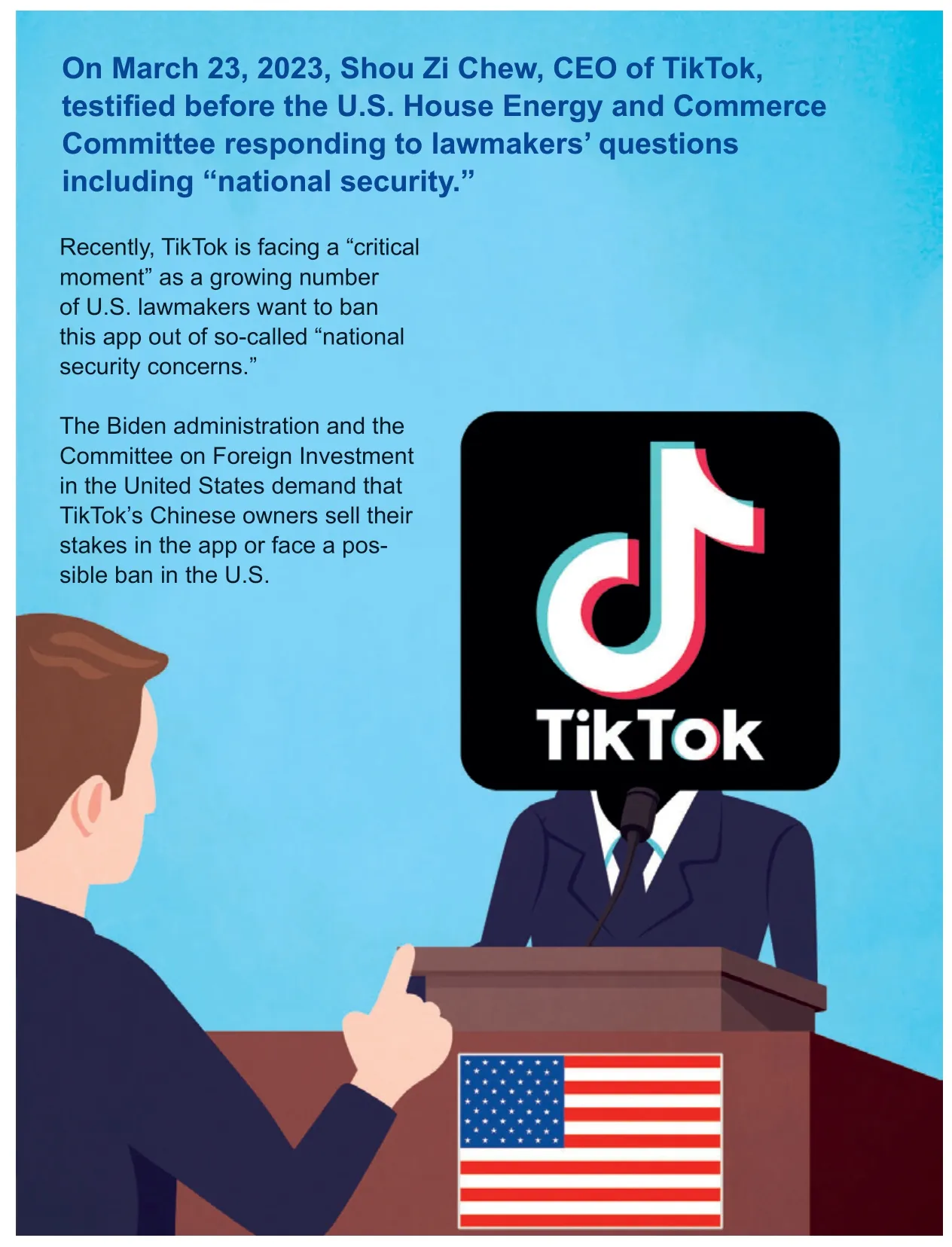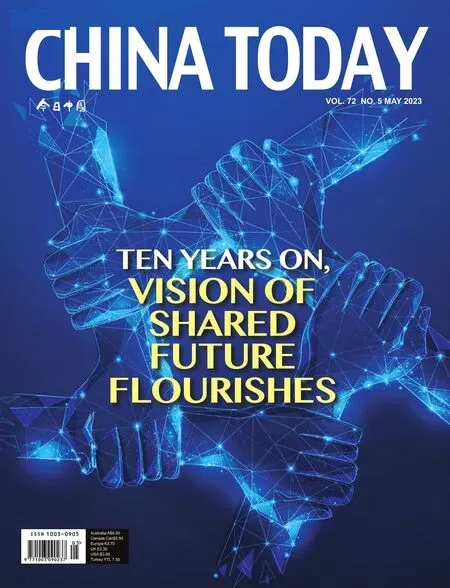TikTok Keeps Ticking Despite U.S.Ban
By YASIR HABIB KHAN

TikTok content creators gather outside the Capitol to voice their opposition to a potential ban on the app in Washington D.C., United States on March 22, 2023.
The public view runs counter to the U.S.government warnings.There are many solid reasonings that rationally oppose White House attempts either to clip the wings of or bury TikTok.
THE concerted efforts of U.S.lawmakers to slap a blanket ban on the short-form video app TikTok have yet to succeed.Meanwhile, the social media platform carries on blithely – and globally – generating happiness and fun.Its younger users, especially the youth of America, do not subscribe to the FBI Director Chris Wray’s dire warning that the U.S.operations of Chinese-owned TikTok raise national security concerns.Among the risks Wray mentioned to U.S.lawmakers was, “the possibility that the Chinese government could use [TikTok] to control data collection on millions of users or control the recommendation algorithm, which could be used for influence operations.”
Western media also find this paranoid U.S.doctrine hard to swallow.A poll published on U.S.media shows that around 54 percent of the 150 million daily TikTok users in the U.S.oppose the ban.Reports moreover suggest that banning Tik-Tok would seriously alienate millennial and Gen Z voters, who remain underrepresented in the U.S.Congress.Unsurprisingly, TikTok is most popular with younger Americans, among whom 59 percent of 18-to-34-year-olds use the app, as compared with 46 percent of those in the 35 to 49 age range,29 percent of people aged 50 to 64, and 13 percent of those who are 65 and older.
American politician and educator Jamaal Anthony Bowman, who has served as the U.S.representative for New York's 16th congressional district since 2021, said in a recentWashington Postinterview, “There is a huge disconnect between lawmakers and many of the new technologies, and with TikTok, it’s easier to just say,‘Ban it, sell it or let us control it.”Bowman believes fears over potential risks associated with the app have been disproportionate to the available evidence about its vulnerabilities.Jamaal Bowman has himself embraced the app, gaining nearly 160,000 followers and two million likes for postings about his thoughts on and the workings of Congress.Bowman holds that TikTok has helped him to reach new constituents,particularly younger ones, whom he would not otherwise have engaged with through any other communication mode.
Unlike Bowman, many of the lawmakers who questioned TikTok CEO Shou Zi Chew do not have a TikTok account.Such a lack of familiarity with the app may be part of what drives lawmakers toward a ban, Bowman said.
European media outlet Politico observed that critics of the cyber espionage argument refer to a 2021 study by the University of Toronto’s Citizen Lab, which found that the app did not exhibit the“overtly malicious behavior”that would be expected of spyware.Meanwhile Asher Wolf, a tech researcher and privacy advocate based in Melbourne, Australia, asserted in a media interview,“…so the noise the Americans are making about TikTok must be seen less as a sincere desire to protect citizens from surveillance and influence operations, and more as an attempt to ring-fence and consolidate national control over social media.”
Naeem Akhtar, CEO of digital social media company Digital Media Trend (DMT) in Lahore,Pakistan, made the point that the U.S.’s banning of TikTok would do nothing to stem the rampant sale of personal CEO information and metadata that all social media companies collect, including those based in the U.S.He added that the relatively lax privacy norms of American tech companies are a sticking point in Europe, which has much stronger data protections.“If politicians and lawmakers really were interested in protecting people from‘evil’or‘nefarious’tech companies, they should instead focus on regulating the entire tech and social media industries rather than pinpointing just one company,”Akhtar concluded.
misgivings
The TikTok management team has done its utmost to address the misgivings and reservations raised by the U.S.government.
During their nearly six-hour long grilling of Tik-Tok CEO Shou Zi Chew, United States lawmakers unilaterally accused the media platform of spying on Americans.They did not, however, mention how the U.S.government itself uses U.S.tech companies that effectively control the global internet specifically to spy on everyone else.
Frankly speaking, apart from such support within media houses in Europe, and in the West generally, in favor of U.S.TikTok operations, there are many other solid reasonings that rationally oppose White House attempts either to clip the wings of or bury TikTok.But digital wizards hold that the U.S.is set on crippling the social media app.
In fact, the TikTok management team has done its utmost to address the misgivings and reservations raised by the U.S.government.Having, since 2019, adapted its content moderation and regularly released transparency reports on what it removes,the company has been touting two “transparency centers”– one that opened in the U.S.in July 2020;the other in Ireland in 2022.The team has also agreed to comply with the new EU content moderation rules contained in the Digital Services Act,which requires platforms to give regulators and researchers access to the company’s algorithms and data.
In responding to allegations of data-sharing with the Chinese government, TikTok flatly denies ever giving data to the Chinese government,and insists that it would decline if asked to do so.Strictly speaking, moreover, ByteDance, mother company of TikTok, is incorporated in the Cayman Islands, which, TikTok argues, should shield it from legal obligations to assist Chinese agencies.
Another argument the company raises is that a mere 20 percent of ByteDance is owned by its Chinese founders, whereas 60 percent is owned by global investors, and 20 percent by employees.The 60 or so percent share of global investors stands testament to the fact that China’s influence is limited by virtue of the bigger share holders that hold sway in policymaking.
In respect of safeguarding data, TikTok has unveiled two separate plans.The first, expedited in the U.S., is Project Texas, a US $1.5 billion plan to build a wall between the U.S.subsidiary and its Chinese owners.The second, in Europe, is the €1.2 billion Project Clover, which will move most of TikTok’s European data to servers in Europe.
It is worth pointing out that it is not just TikTok and its mother company “ByteDance”that are accused of privacy breaches and cyber espionage.Both Uber and Facebook have been similarly accused over the years.Microsoft admitted to accessing a French blogger’s private Hotmail account to identify a former Microsoft employee who had leaked the compoany’s trade secrets in 2012.Neither of the services faced a potential nationwide ban as a result.
It appears that there are no big tech companies these days that do not face unprecedented levels of scrutiny.But TikTok, unlike its peers, faces not just opposition but also an out and out ban.At this time of rocky U.S.-Chinese relations, TikTok’s popularity may appear to threaten America’s technological superiority, especially when it comes to the internet.But the focus of U.S.lawmakers is squarely on the perceived threat that TikTok poses to national security, convinced as they are that the Chinese government uses the app to spy on Americans.
TikTok is doing its utmost to convince its detractors that it does not take orders from China,and that it would never give the Chinese government U.S.user data or attempt to influence U.S.users.The company briefed think tanks in late January, and gave journalists a tour of its new transparency and accountability center in February.
Before Biden took office, Trump issued his executive order declaring that TikTok was a national security threat and, through the International Emergency Economic Powers Act, ordering either that it be sold to an American company, or banned within 45 days.This obviously did not happen.President Joe Biden eventually rescinded the order,which was controversial to say the least, leaving it to the Committee on Foreign Investment in the U.S.to make a deal with ByteDance.
“We firmly oppose the U.S.’s overstretching of the concept of national security and its abuse of state power to hobble and plunder foreign companies.The U.S.should respect the principles of market economy and fair competition, stop suppressing foreign companies and provide an open,fair, just, and non-discriminatory environment for foreign businesses to invest and operate in the U.S.,”was the statement of Wang Wenbin, Chinese Foreign Ministry spokesperson, on March 17.Another spokesperson Mao Ning, further pointed out on March 24, “The Chinese government has never asked and will never ask any company or individual to collect or provide data, information or intelligence located abroad against local laws.The U.S.government has provided no evidence or proof that TikTok threatens U.S.national security.”
utmost
TikTok is doing its utmost to convince its detractors that it does not take orders from China, and that it would never give the Chinese government U.S.user data or attempt to influence U.S.users.


